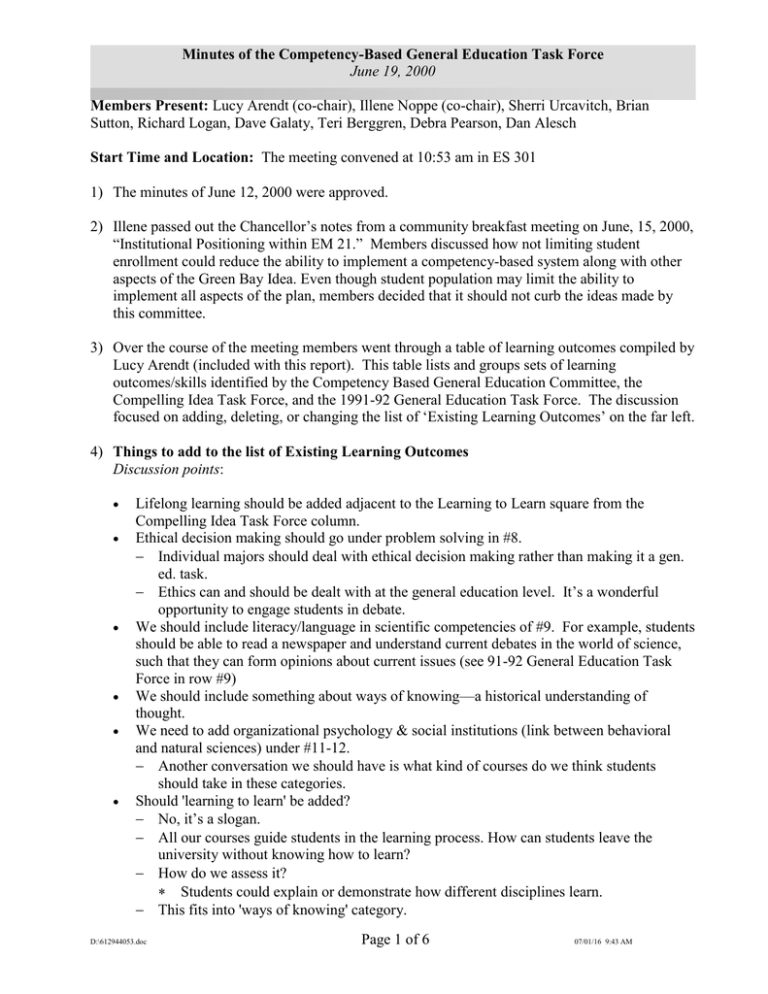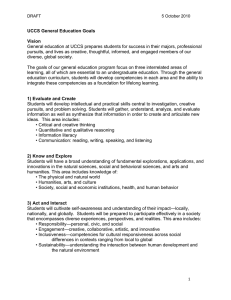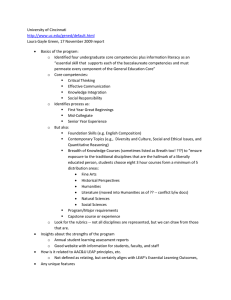6-19-00
advertisement

Minutes of the Competency-Based General Education Task Force June 19, 2000 Members Present: Lucy Arendt (co-chair), Illene Noppe (co-chair), Sherri Urcavitch, Brian Sutton, Richard Logan, Dave Galaty, Teri Berggren, Debra Pearson, Dan Alesch Start Time and Location: The meeting convened at 10:53 am in ES 301 1) The minutes of June 12, 2000 were approved. 2) Illene passed out the Chancellor’s notes from a community breakfast meeting on June, 15, 2000, “Institutional Positioning within EM 21.” Members discussed how not limiting student enrollment could reduce the ability to implement a competency-based system along with other aspects of the Green Bay Idea. Even though student population may limit the ability to implement all aspects of the plan, members decided that it should not curb the ideas made by this committee. 3) Over the course of the meeting members went through a table of learning outcomes compiled by Lucy Arendt (included with this report). This table lists and groups sets of learning outcomes/skills identified by the Competency Based General Education Committee, the Compelling Idea Task Force, and the 1991-92 General Education Task Force. The discussion focused on adding, deleting, or changing the list of ‘Existing Learning Outcomes’ on the far left. 4) Things to add to the list of Existing Learning Outcomes Discussion points: Lifelong learning should be added adjacent to the Learning to Learn square from the Compelling Idea Task Force column. Ethical decision making should go under problem solving in #8. Individual majors should deal with ethical decision making rather than making it a gen. ed. task. Ethics can and should be dealt with at the general education level. It’s a wonderful opportunity to engage students in debate. We should include literacy/language in scientific competencies of #9. For example, students should be able to read a newspaper and understand current debates in the world of science, such that they can form opinions about current issues (see 91-92 General Education Task Force in row #9) We should include something about ways of knowing—a historical understanding of thought. We need to add organizational psychology & social institutions (link between behavioral and natural sciences) under #11-12. Another conversation we should have is what kind of courses do we think students should take in these categories. Should 'learning to learn' be added? No, it’s a slogan. All our courses guide students in the learning process. How can students leave the university without knowing how to learn? How do we assess it? Students could explain or demonstrate how different disciplines learn. This fits into 'ways of knowing' category. D:\612944053.doc Page 1 of 6 07/01/16 9:43 AM Minutes of the Competency-Based General Education Task Force June 19, 2000 What about religion? This would fit nicely in a ‘ways of knowing’ category. What should be added adjacent to ‘Math and Symbolic Language’? Calculation skills and statistical literacy are important. General math college base (sophomore assessment) should be used as a base in determining skills/competencies. Math could be added in with 1st 8 outcomes as ‘the ability to think quantitatively’. All agree this is what we should do. 5) Things to delete or change from the list of Existing Learning Outcomes Discussion Points: Should we strike ‘western’ from #13? No We’re teaching largely American students. It’s not a bad thing to teach them about their own history. You need to know the canon before you critique it. Yes We’re creating an ‘us vs. them’ situation Our goal is to teach students to understand cultures in the terms of their own culture. If we turn the emphasis on competencies vs. domains, the western vs. nonwestern would not be an issue. Consensus Change ‘western’ to ‘western and non-western.’ #16 What do we think about performing arts satisfying this category? Students could take several performing arts classes without being exposed to theory. Consensus: Performing arts classes would be adequate, since most instructors will include some theory in performance instruction. #18 Keep the phrase ‘within USA’ (when compared to #17). 6) Members raised concerns about the assessment and implementation of the learning outcomes: Discussion points: Members agree that faculty should be doing the assessing of outcomes. We should decide whether or not something could be assessed before we put it in the final report. Faculty development is essential for providing sound assessment of standards. Faculty members need to clearly understand the role of general education and learn ways to assess students within those parameters. What about student who need to drop in for two weeks and not take the whole class? There are the CLEP/Challenge exams. The idea that a student could drop in for 2 weeks of a semester and prove competencies is uncomfortable for many members. It’s important that a system be set up to regularly review and change the learning outcomes to make sure they make sense. D:\612944053.doc Page 2 of 6 07/01/16 9:43 AM Minutes of the Competency-Based General Education Task Force June 19, 2000 This allows for evolution of learning outcomes Domains vs. competencies Domains are areas of study. Competencies are types of knowledge (e.g. vocabulary, theory, research, ethical decision making). Right now we’re trying to fit the competencies into respective domains. We could, as an alternative, switch our focus on broad-based competencies and let the faculty in each domain worry about what constitutes each competency. This process approach makes assessment easier and fairer for students. It gives students a better explanation of what’s expected to be successful in class, while giving professors clear parameters for assessing students’ skills. This is what needs to be sold to faculty. Illene passed out a table demonstrating how different outcomes could potentially be evaluated and tracked. 7) Members discussed what needs to be done at the next CBGEC meetings. We need to decide if we want competencies to be evaluated on a pass/fail or graded basis. Create/edit last portion of the report. Any additional comments on the first draft should be emailed to Lucy Arendt. 8) Meeting dates, times, and locations for the rest of the month: Friday, June 23, 2000 10:45A.M.-12:45P.M. E.S. 301 Conference Room Monday, June 26, 2000 10:45A.M.-12:45P.M. E.S. 301 Conference Room Friday, June 30, 2000 10:45A.M.-12:45P.M. E.S. 301 Conference Room The committee adjourned until its next meeting, scheduled for June 23, 2000. Respectfully submitted, Teri Berggren D:\612944053.doc Page 3 of 6 07/01/16 9:43 AM Minutes of the Competency-Based General Education Task Force June 19, 2000 Existing Learning Outcomes 2. 3. Skill The ability to look at things from multiple disciplinary perspectives. The ability to listen effectively The ability to speak effectively 4. The ability to read effectively 5. The ability to write effectively 1. Compelling Idea Task Force 1991-92 General Education Task Force Skill Skill Effective Communication 6. The ability to use computers effectively Technology and Information Literacy 7. 8. Problem Solving/Critical Thinking The ability to think critically. The ability to exercise problem-solving skills - such as problem identification and analysis, and solution formulation, implementation, and assessment. Ethical Decision Making 9. 10. Knowledge/Content A fundamental understanding of the Natural Sciences, including major concepts, principles, and theories of the biological and physical environment. A fundamental understanding of the Page 4 of 6 07/01/16 9:43 AM Learning to Learn Knowledge/Content Environment Science and Scientific Ways of Thinking Science and Scientific Ways of Basic Communication Skills. 3. Ability to speak articulately with others and to defend one's ideas in debate. Basic Communication Skills. 1. Familiarity with a good newspaper and some more specialized journals for lay people (e.g., New York Review of Books, Scientific American) as well as an ability to relate such reading to life issues important to the student. Basic Communication Skills. 2. Ability to write standard English in a grammatical, well organized fashion. Basic Communication Skills. 4. Ability to operate with ease in a modern library. 5. Basic computer literacy and elementary keyboard skills (may be achieved before matriculation). Great Works. 9. Understanding of ethical systems, their root in human nature and culture, and ways that ethics can be applied to problems in a student's current and future life. Knowledge/Content Sciences: Biology. 1. Knowledge of the basic vocabulary of the biological sciences. 2. Knowledge of current theories of basic processes in the biological sciences. Application to students' lives. Sciences: Physical Sciences. 1. Knowledge of the basic vocabulary of the physical sciences. 2. Knowledge of current theories of basic processes in the physical sciences. Application to current issues. Sciences: Perspective. Minutes of the Competency-Based General Education Task Force June 19, 2000 Existing Learning Outcomes 11. 12. 13. Natural Sciences, including the impact of scientific and technological activities and products on individuals, on society, and on the physical environment. A fundamental understanding of the Social Sciences, including major concepts of social, political, geographic and economic structures. A fundamental understanding of the Social Sciences, including the impact that social institutions and values have on individuals and groups in a culture. A fundamental understanding of the Humanities, including the significance of major events and movements in Western civilization. 14. A fundamental understanding of the Humanities, including a range of literature, representative of different literary forms and historical contexts. 15. A fundamental understanding of the Humanities, including the role of the humanities in identifying and clarifying individual and social values in a culture and understanding the implications of decisions made on the basis of those values. A fundamental understanding of at least one of the Fine Arts, including an understanding of the nature and function(s) of art and one or more ways of distinguishing good art. 16. Page 5 of 6 07/01/16 9:43 AM Compelling Idea Task Force Thinking Social Science Analysis and Public Affairs Humanities Study and Production of the Creative Arts 1991-92 General Education Task Force 1. Knowledge of the historical development of the sciences. 2. Appreciation for the strengths and limitations of scientific understanding. 3. Knowledge of the ways scientific knowledge affects our approaches to political, social and economic questions, as well as our approaches to personal identity. Social Sciences. 1. Understanding of the basic vocabulary of the social sciences. 2. Understanding of the primary scientific ways of understanding human beings in their social/cultural settings. 3. Understanding of economic theory on both the macro and micro levels. Ability to apply this theory to contemporary issues. Understanding of the ways economic decisions are affected by political and social systems and climates. Historical Development of Western Culture. 1. Familiarity with the historical development of western culture, with emphasis on the development of modes of thought, relationships among ideas, social structures, economic forms, geographic location, and political events. Great Works. 1. First hand acquaintance with many of the influential writings produced in western culture. 2. First hand knowledge of the most influential works produced by Asian and other non-western cultures. Great Works. 8. Understanding of the various ways of understanding the subjective experience of human beings and of relating this subjective experience to human behavior. Great Works. 3. First-hand acquaintance with major works of art and music representing different styles and eras produced in western culture. 4. First-hand acquaintance with non-western styles in art and music. 5. Acquaintance with approaches to critical understanding of creative works. 6. Experiences of an art museum, a symphony, a drama (in the context of current study or previous study). 7. Experience of creating or performing at least one artistic work. Minutes of the Competency-Based General Education Task Force June 19, 2000 Existing Learning Outcomes Compelling Idea Task Force 17. A fundamental understanding of contemporary global issues and problems related to ethnocentrism, through the study of beliefs, values, and ways of life in a country other than the USA. Global Understanding 18. A fundamental understanding of the causes and effects of stereotyping and racism, and an appreciation of cultural diversity within the USA. Diverse Communities Math and Symbolic Languages Page 6 of 6 07/01/16 9:43 AM 1991-92 General Education Task Force Historical Development of Western Culture. 2. (p. 13) Knowledge of the historical development of world cultures. 4. Knowledge of world geography (listed as 3 in Appendix VII). Appreciation for Other Ways of Living and Communicating. 1. Basic proficiency in a foreign language. Understanding of how language affects our personal identities and the shape of our culture. (may be achieved before matriculation). 2. Experience in a culture other than one's own (Highly recommended, but may be achieved vicariously in other culture courses). Knowledge of ways of understanding other cultures. Historical Development of Western Culture. 2. Knowledge of the development of United States culture, as that culture has developed in a western and world context. Understanding of the origins and experience of social groups in the United States who identify themselves as marginal to United States culture. Sciences: Method. 1. Basic first-hand appreciation for the important roles played by observation/experiment and reasoning/mathematics in the development of knowledge (scientific method). 2. Basic proficiency in mathematics (may be achieved before matriculation).


